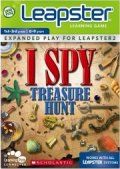 About GamePeople
About GamePeople
Subscribe to the Family Gamer column:![]() RSS or
RSS or
![]() Newsletter.
Newsletter.

Format:
LeapFrog
Genre:
Minigames
Further reading:
Self Improvement
Buy/Support:
Support Andy, click to buy via us...
The LeapFrog is a more robust, less powerful version of Nintendo's handheld systems. Its games are aimed at a younger audience and usually more overtly educational in their approach. I Spy Treasure Hunt tells a story about pirates as players solve matching and spotting puzzles.
Self Improvement games tap into the popular trend in self development and therapy. Experiences as diverse as Brain Training DS and Wii-Fit have popularised the idea that games can be about more than just having fun - they can improve your brain, body and even mental outlook on life.
LeapFrog games are unique because they are tailored to a very young audience. The hardware has a hard wearing Fischer Price feel, and will take more knocks then Nintendo's consoles. The games also cater exclusively for the young gamer, without having to keep an eye on an older demographic at the same time.
I Spy Treasure Hunt, as its name suggests, is all about spotting visual differences and similarities in particular settings. Players match shapes and hunt for treasure, build a boat, answer riddles to earn pieces of a pirate treasure map. sort items from a treasure chest.
Unlike DS games that focus more on the gaming with education being a happy side effect, the focus here is on the educationally merit of each level. I Spy Treasure Hunt has been specifically designed to teach shapes, letters, vocabulary, rhyming, memory skills, logic and reasoning and problem-solving skills.
The screen definition is not as high as the DS, and players often have to scroll around a particular scene while they play the game. The game also responds a little slower to touches from the player - something that can lead to multiple touches and added confusion.
Very young players will be excited to get their hands on a real games system, just like older siblings, or perhaps mum and dad, play. Once player, there is plenty to keep them involved. The pirate theme and variety of activities ensure this is fun as well as educational. Playing the first few levels will strike those watching as very similar (in structure and presentation) to popular children's television programs - which is no bad thing in our book.
Each task will take players around three minutes. Stringing together a few of these should enable them to unlock a puzzle piece. Like this, sessions of around twenty to thirty minutes should suffice. Although the game has less content then a more grown up DS or Gameboy game, there is enough o keep players entertained for a good fifteen to twenty hours here. Add to this a degree of welcome repetition and the games offers considerable value for money.
Pre-school and early years players will enjoy I Spy Treasure Hunt and rise to the challenge it sets them. Although a good grasp of letters and numbers is required, the high level of spoken instruction makes this more accessible than many DS games that rely on reading.
Those a little older may find the more quirky style of Quickspot DS (a spot the difference game) a little more suited.
Intermediates and Experts will find both the clunky hardware and game difficulty rules this out for them. But then that is the intention of the game, and a sign of its suitability to a younger audience. These players may enjoy Quickspot DS too if they are looking for a similar experience.



Andy Robertson writes the Family Gamer column.
"Videogame reviews for the whole family, not just the kids. I dig out videogame experiences to intrigue and interest grownups and children. This is post-hardcore gaming where accessibility, emotion and storytelling are as important as realism, explosions and bravado."
Here are the games I've been playing recently:
© GamePeople 2006-13 | Contact | Huh?

|
Family Video Game Age Ratings | Home | About | Radio shows | Columnists | Competitions | Contact
With so many different perspectives it can be hard to know where to start - a little like walking into a crowded pub. Sorry about that. But so far we've not found a way to streamline our review output - there's basically too much of it. So, rather than dilute things for newcomers we have decided to live with the hubbub while helping new readers find the columnists they will enjoy. |
Our columnists each focus on a particular perspective and fall into one of the following types of gamers:
|